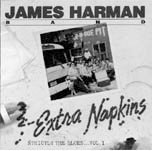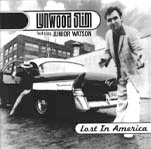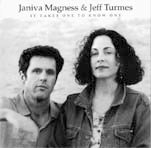James Harman Band
Extra Napkins
Cannonball 29102
Lynwood Slim Featuring Jr. Watson
Lost in America
Whistle Stop 2011
Janiva Magness & Jeff Turmes
It Takes One to Know One
Fat Head 1001
|
|
In the late 1980s a vibrant blues scene was percolating in Southern
California, a world apart from better-known Chicago and the Southern
blues cities. Headed up by harp players like the late William Clarke,
Rod Piazza and James Harman ó under the tutelage of more historical
figures like Johnny "Guitar" Watson, Joe Turner, George Smith
and Smokey Wilson ó the efforts of this mini-blues community were well
recorded by the local Rivera label. A cast of then lesser-knowns, now
famous, like Kid Ramos, Fred Kaplan, Jimi Bott, Gene and Larry Taylor,
and most notably Jr. Watson and Hollywood Fats, were playing musical
chairs as members of bands put together by all the aforementioned
leaders. The music they were playing then ó a combination of Chicago,
jump, swamp and swing ó would become, by the late í90s, the blueprint
for blues popularity across the U.S.
Guitarist Watson is the thread of continuity between these three
recordings ó Harmanís re-released 1988 effort for Rivera, Slimís
 reissued early í90s album and this yearís work from Magness/Turmes. The
much-heralded Hollywood Fats is the most notable string slinger on
Extra Napkins (recorded from 1985Ė1987), and, great as Fats is,
Kid Ramos puts in just as strong an effort as second guitarist, with
Harman blowing and singing like he hasnít in many years.
reissued early í90s album and this yearís work from Magness/Turmes. The
much-heralded Hollywood Fats is the most notable string slinger on
Extra Napkins (recorded from 1985Ė1987), and, great as Fats is,
Kid Ramos puts in just as strong an effort as second guitarist, with
Harman blowing and singing like he hasnít in many years.
The album rocks hard, right from the chordal harp chiming that opens
the first cut, "Itís Alright Now", and the pumping rhythm
section of Willie Campbell and Stephen Hodges establish a groove they
never let up. As you would expect, Fats burns through slow cuts like
"My First Crime" and the more traditional "Party
Girl," and thereís a great bit of idol worship as he and Ramos
attempt to approximate Robert Jr. Lockwood and Luther Tucker on Sonny
Boyís "Sad to Be Alone." The horns cast a whole new mood on
"School Girl." And be sure to listen to the great piano work
by Kaplan and Gene Taylor ó their contributions actually surpass those
of the guitarists, and in tandem with the latter give evidence why this
was one great blues band. This is a terrific, much appreciated
re-release, and hopefully label owner Ron Levy has more coming.
Watson had been Harmanís roommate at the time Extra Napkins
was cut, and was then playing with Piazza. Although he was a minor
player on the Napkins, by 1993, when he teamed with Lynwood Slim
 for Lost in America, his reputation among guitarists had been
etched, and his work with Slim here is just outstanding. Like Fats and
Ramos, Watson is a superb harp accompanist, and his swinging style is a
fine fit for Slimís smoother vocal approach and more sophisticated harp
playing.
for Lost in America, his reputation among guitarists had been
etched, and his work with Slim here is just outstanding. Like Fats and
Ramos, Watson is a superb harp accompanist, and his swinging style is a
fine fit for Slimís smoother vocal approach and more sophisticated harp
playing.
Iíve always felt Slim was a singer most comfortable in the vein of
Charles Brown, and his work here on swing tunes like "Itís
Obdacious" (with a melodic, angular solo by Watson) and a
beautiful, slow rendering of Little Walterís "Just Your Fool"
evidence a vocal style apart. Slimís also a fine harp player, schooled
by Walter Horton, and blows straight ahead on tunes like "Iím
Tired" and John Lee Hookerís "Messiní With My Bread."
Once again, Kid Ramos is all over this disc, as is Fred Kaplan, whose
piano work is an easily overlooked highlight. Another fine reissue, and
if you like whatís here youíll really dig Slimís vocal work with Dave
Specter on last yearís Left Turn on Blue.

Jeff Turmes was a bit player on Extra Napkins, and for years
has been one of the finest multi-instrumentalists in West Coast blues;
he is also a six-year veteran of Harmanís bands. Magness is a
rich-toned, expressive vocalist who has worked with Ramos (you can hear
her on his Two Hands One Heart) and a host of SoCal notables,
most recently in a duet format with Turmes. Their CD was reviewed in the
last issue of BLUES ACCESS, I wonít spend a lot of time echoing
earlier, positive sentiments. Just let me add that if you want a taste
of contemporary blues work and writing from L.A., this all-original
first outing is it: The music is dead-on as backing for the lyrics,
which are infused with a hipper perspective a la Tom Waits or Rickie Lee
Jones as filtered through Alberta Hunter. And Magness plays a mean blues
kazoo. All-in-all, no retreads of blues chestnuts here, something new
and fresh that portends much for Magness and Turmes, as well as the
fertile Southern California blues scene anchored by Watson and
compatriots.
ó Tom Ellis III
This page and all contents are © 1998 by Blues Access,
Boulder, CO, USA.
 reissued early í90s album and this yearís work from Magness/Turmes. The
much-heralded Hollywood Fats is the most notable string slinger on
Extra Napkins (recorded from 1985Ė1987), and, great as Fats is,
Kid Ramos puts in just as strong an effort as second guitarist, with
Harman blowing and singing like he hasnít in many years.
reissued early í90s album and this yearís work from Magness/Turmes. The
much-heralded Hollywood Fats is the most notable string slinger on
Extra Napkins (recorded from 1985Ė1987), and, great as Fats is,
Kid Ramos puts in just as strong an effort as second guitarist, with
Harman blowing and singing like he hasnít in many years. for Lost in America, his reputation among guitarists had been
etched, and his work with Slim here is just outstanding. Like Fats and
Ramos, Watson is a superb harp accompanist, and his swinging style is a
fine fit for Slimís smoother vocal approach and more sophisticated harp
playing.
for Lost in America, his reputation among guitarists had been
etched, and his work with Slim here is just outstanding. Like Fats and
Ramos, Watson is a superb harp accompanist, and his swinging style is a
fine fit for Slimís smoother vocal approach and more sophisticated harp
playing.